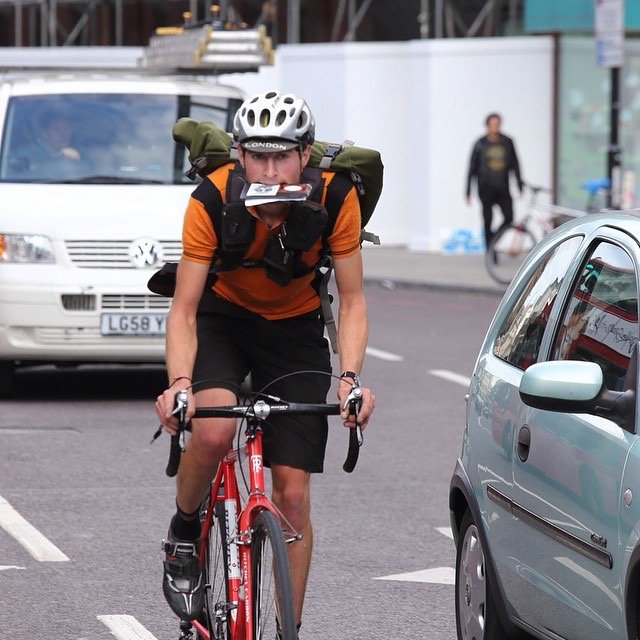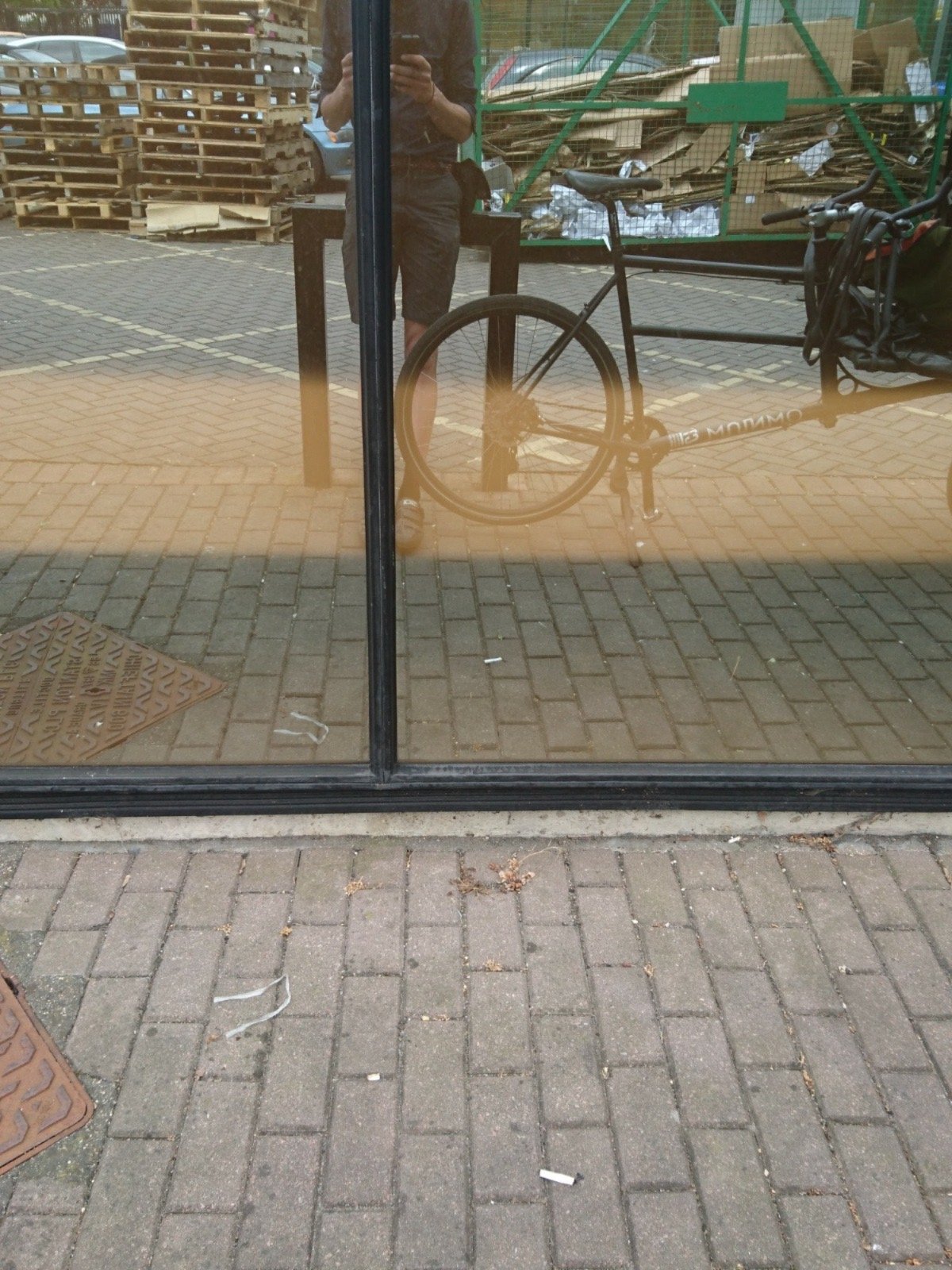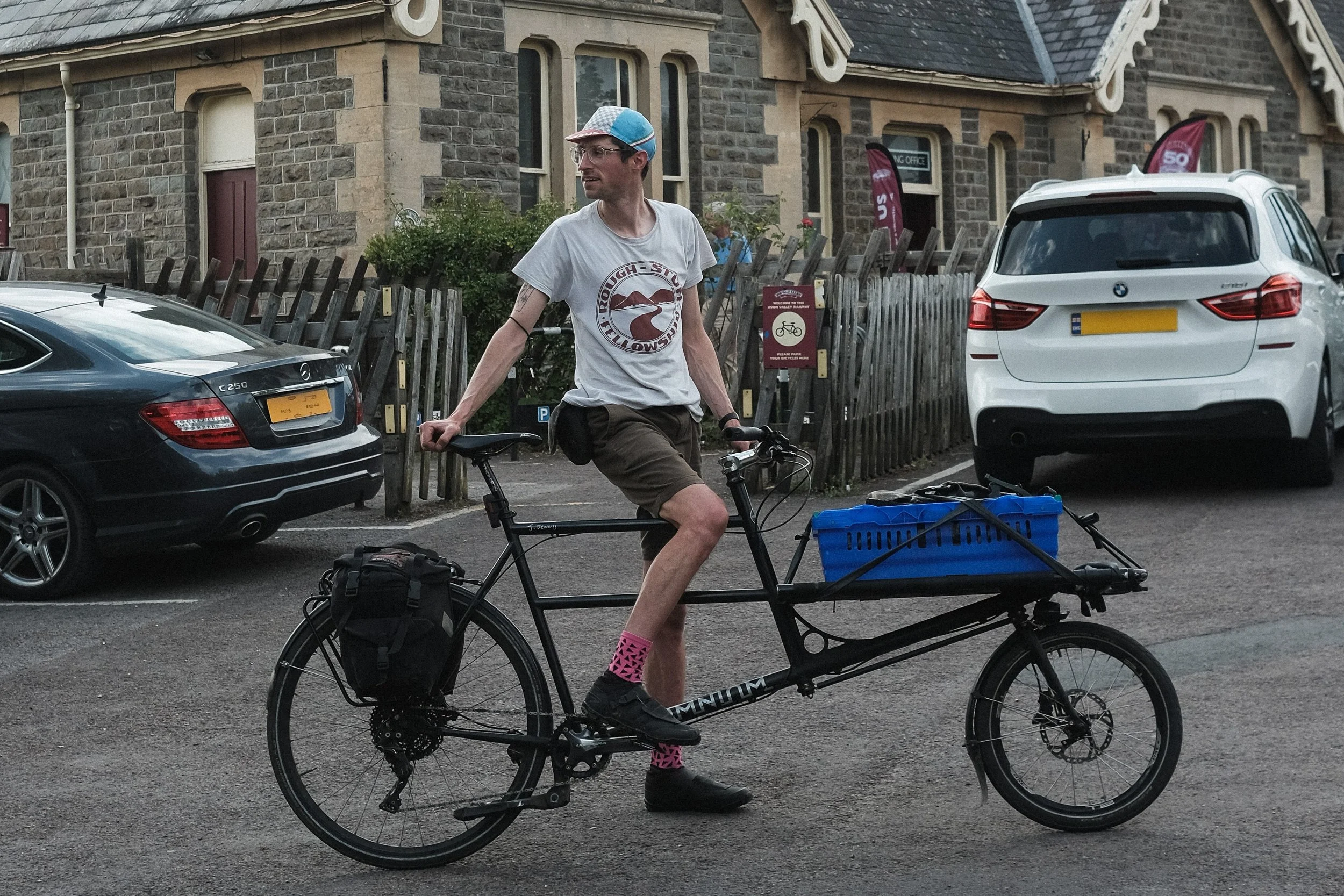The City Needs Bike Couriers
Interview by Chris Hunt
A conversation with Jon Dennis, co-founder of Pedal Collective, Bristol’s bike courier co-operative making city centre deliveries by cargo bike.
Photo: © Tad Jiunn
It doesn’t take much to get me giddy about the functionality of bikes. Pedalling up the Bristol - Bath railway path towards my home in the East of the city as the glow of the winter sun sets behind me is more than enough. Bikes of all shapes and sizes and people of all walks of life riding them. It flows, people smile and acknowledge each other. A little slice of utopia.
I peel off onto the short section of road connecting the path to my front door and instantly there’s trouble. A large van grapples with a space two thirds its size as two cars squeeze impatiently by. I unclip and wait. There’s barely an inch to spare as the van backs into the parked car behind before swinging hastily out into the middle of the tight street. The hazards blink and the driver emerges from the door, his arms struggling to contain dozens of parcels destined for addresses up and down the street.
This is a major rat run through what is probably the most densely populated part of the city. A queue of cars soon develops on both sides, horns blare and doors slam as insults and threats fire across the street. I hop onto the pavement keen to eject from the situation.
The encounter is just days after I’m made redundant from a job as a bike courier for a startup facing the same pressures. Desperate to compete with the same volumes and the same unrealistic expectations of the likes of Amazon and Evri, in many ways it was always destined to fail.
It’s not an easy job. The expectation of fast, efficient service and free delivery inevitably sees the pressure pile onto those with the least to gain from an entirely broken system. But surely there’s a better way, something more aligned with my experiences on the bike rather than the frustrations I recognise in my own vehicle trying to squeeze around the narrow city roads with thousands of others.
Prioritising a sense of community and integrity over profits margins and bigger volumes, Pedal Collective is a new cooperative of bike couriers in Bristol who set out to do things a little differently, where the security of the job itself is more important than growing the revenue it generates.
I caught up with Jon Dennis, one of its five co-founding members to chat about his career as a bike courier and their hopes for Pedal Collective.
How did you fall into work as a courier initially?
I'd just left university with a decent degree from a decent university but couldn’t find a job. I was into fixed gear bicycles, bike polo etc, like a lot of people back then. My girlfriend at the time lived in London and I moved to join her just before Christmas with no job when delivery work was peaking. I walked into a courier's office and got the job.
I spent most of that Christmas lost in London leafing through a A-Z trying to understand my controller attempting to communicate with me on a radio with his thick South London accent. I worked at that company for a few years then joined CTRL, a cooperative who were using cargo bikes to move coffee, fashion and cakes around London.
And what keeps you doing it today?
The job works well for a personality that wants freedom, but not too much. You don’t want a manager looking over your shoulder all the time, but you still want to get told where to go and when.
There’s the physicality of it. There’s something about finishing a day and barely having the energy to cook dinner. It’s satisfying. I did alright from it and was a semi-decent bicycle racer for about seven years, getting some okay results without any training – I raced cyclocross, won the London league three or four years in a row, came 11th in the Three Peaks, 18th in the National Champs. Obviously there’s another side to that physicality, cumulative fatigue. Friends, partners want you to socialise in the evenings but all you can manage is wolfing down dinner and vegging out on the sofa.
You also get to learn a city inside out, knowing five different ways to get from A to B without looking at a phone. Knowing the best places to eat, getting to know the people around the city, seeing the things which make it tick, make it go around. To me it feels like a wider worldview than working in an office. The city is your desk.
Then there's the first day of spring where you strip off your layers of clothing and bear your arms for the first time in five months. The receptionists stop with the ‘wouldn't want to be you today’ and become jealous for a few summer months. But it’s also those perfect sunny days in winter where it’s light for six hours and you’re nearly the only people able to enjoy it as everyone else is inside working.
How have you seen it change over the years you’ve been riding?
When I first started, I caught the very end days of the traditional bicycle messenger. It was still A-Zs and radios on your shoulder. Smaller packages as film and legal bods were still sending documents. The decline obviously started with fax machines and then the internet, that’s about when I started. Covid followed and reduced it further but we still survive! We’re a resilient lot, who stay flexible and make our own work.
Cargo since moved on from documents and tapes to hard-drives then to food and fashion. Now with cargo bikes we can carry more and expand what can be delivered by bicycle. Technology has changed the job, making it much more accessible. You don't really even need to able to map read anymore. Some days I resent having to look at my phone so much but it's much easier than trying to get signatures for parcels on a soggy battered piece of paper, and leafing through an A-Z, that’s probably missing all the pages you actually need.
It’s quite a different job from what it used to be, no-ones riding brakeless track bikes to deliver 50kg of coffee from a roastery to a cafe! Very rarely is there a mad rush on most work nowadays so there’s no real need to ride like a prick. Riding fast isn’t about jumping red lights and looking like you’re in a Lucas Brunelle video. It’s about being efficient and smooth and not making errors.
What do you feel like the general mood of the public is towards bike couriers?
I think there’s always the misconception that courier work is simple and unskilled, but I’d like to see an office worker jump into a multi-drop couriers van and work out how to sort and deliver to 150 addresses in a day with a dodgy app that crashes every 15 minutes!
Photo: © Tad Jiunn
Messengers and couriers in general are expected to work solo and work things out themselves. That’s good and bad. I’d love to say the job is for everyone, that anyone can do it with adequate training, but that's not the case. It’s a hard job – it rains for days on end in winter, it's physical and you're never going to get rich from it.
But I’ve never really felt any animosity from the public. Obviously there’s the occasional white van complete with a fragile masculinity who gets a bit upset when you filter past the queue in the bike lane looking like you enjoy your job.
Outside of capital cities most people's perception of bike couriers comes from Deliveroo and food riders, and that's not the best example to take. Dodgy gig economy employment leads to dodgy cheap electric bike technology that has the habit of catching fire, and dodgy riding, chasing pennies to scrape a living. There needs to be legislation to stop the race to the bottom. It affects all of us. Customers get used to delivery for free from the likes of Amazon or Deliveroo, and as soon as a reputable company starts charging a fair fee for delivery, the client or end customer baulks. It's the same as food production, the end customer rarely considers the part they can't see.
But, I think in a city like Bristol, with plenty of environmental awareness, and an openness to seeing things differently, there are plenty of people stoked to see deliveries by bicycle. We should be shouting about it and spreading awareness that not actually everything needs to go in a van, and not everything needs to be produced and delivered by a multinational corporation within 30 minutes.
So what is it about cargo bikes in your opinion that make so much sense for moving stuff around the city?
Firstly, ignoring all the numbers and the data, it's more fun and we're less stressed than our van driving counterparts. Humans are designed to move; driving a van around tight busy streets rammed with traffic, navigating bus lanes, bus gates and LTNs which potentially lead to a fine equivalent to half a day's wages, is inherently stressful. Riding a bike is good for stress, which leads to happier people, and better interactions with other users of the city and space. It's a bit idealistic, but what would you prefer, everyone walking or cycling around, your delivery coming right to your door, or endless traffic jams, with your Amazon driver stopping in the middle of the road, because he can't afford the time to find a parking space, whilst traffic behind him builds up and gets angrier and angrier?
More quantifiably, bikes can use bike paths, short-cuts, they're small and manoeuvrable, really easy to park and they can pull up right next to the door. Bikes are low cost and they have low maintenance costs. Electric cargo bikes might be expensive compared to regular bicycles, but electric vans are another level on top of that.
There are no emissions from bikes, and very low release of micro-plastics compared to both ICE and EV cars and vans, which actually account for over a quarter of microplastics released, going straight into our lungs and our brains.
Obviously there are limits to what can be moved on a cargo bike, I think there’s always going to be a use for vans but so much of it could be taken by bikes.
With electric cargo bikes, you can go further, faster and carry more. You don't need to be quite as fit as once did, which opens up the job to more people. We're seeing more and more of these trikes or quads which are actually closer to small vans, they weigh 150kg and the riding position is so inefficient nearly all the power comes from the motor and there's still questions over their legality.
The government has recently pushed back against calls to increase the power that electric bikes can use in public, which is going to be a limiter on these vehicles. I find it hard to believe a 250w motor can push a 150kg vehicle loaded with 150kg of goods up Park Street for example, but maybe that's just me. Obviously they can carry a bit more around flat cities and I'm sure they will have a role to play, but I also think these vehicles lose lots of the advantages that a regular cargo bike has, they're complicated, expensive to buy and expensive to maintain. Try and bring one of those into a bike shop and take a look at that face of the mechanic.
They don't have the manoeuvrability or ability to use some bike lanes. To me they feel like a prototype small van pretending to be a bicycle, operating in a grey area of the law. It's hard to make them work in an industry with such low profit margins because of initial costs and then the cost of ongoing maintenance.
Photo: © Tad Jiunn
What’s your model at Pedal Collective as a co-operative and why are you hopeful that it might work where others in the city have failed?
Initially we are four full-time riders and one back office tech expert helping us get set up. We're all taking an equal split with an equal share of decision making. Everyone is expected to do things other than riding that will contribute to its success. There’s a small meeting every week then a longer meeting every month.
Obviously there are going to be issues and imbalances and politics that we’ll have to work out along the way and everyone is going to have to learn about conflict resolution, but the idea is that everyone is motivated to work and do a good job. If you land a big client, everyone gets more work and gets paid more, if you work a long tough day, you’re going to get paid more, if you fuck up it’s going to directly impact the business and yourself and your colleagues. You’re not blameless and you’re not thankless. There's more motivation to work hard and a higher sense of job satisfaction.
This obsession with endless growth from businesses nowadays is of no interest to us, I've worked in those places and it breeds disconnection and resentment. We want to make a fair living for a small group of us, do something we enjoy and help other people and businesses we like, not try and make someone else rich.
So it sounds like you’re going to be specific about the kinds of businesses you chose to work with… Why is that so important?
I grew up listening to a lot of punk and that DIY independent mentality stuck. The views of the likes of Ian Mackaye and Steve Albini mean a lot to me. Retaining independent control, in any business is important. Signing up to one big client effectively means a small company becomes an arm of the big client, which is something we want to avoid. Being able to say no to money and big business and standing up for what you believe in is something we take seriously.
Photo: © Tad Jiunn
If there’s one thing I’ve learnt over the last few years it’s that claiming to be sustainable, then delivering plastic produced in highly questionable conditions shipped over from China to people with no money shopping at a website with the motto shop like a billionaire is a fast route to misery, for everyone involved.
We’re committed to not getting fucked over by the big guys. We actually voted on it. We want to work with people we like, who produce things we like and who respect the job we’re doing and treat us fairly. Keeping it smaller benefits local clients. If a business gets bloated and oversized and dedicates all its time and resources to making pennies off a major nationwide player they forget the smaller businesses, we want to make them the main focus.
And what are you riding?
At the moment we're using Larry vs Harry Bullitts, which are the opposite of those trikes and quads imitating small vans. They handle like a normal bike, you can filter past cars but they can still comfortably handle 150kgs.
And we’re focusing on things that work well with the resources we have, smaller, higher-value items that need a personal touch, where the client knows the courier isn’t going to leave it outside in the rain and will deliver it with a smile on their face.
So do you think the client customers appreciate the fact you guys arrive by bike too?
It’s Bristol! Despite the hills and some not so great cycling infrastructure, it’s a city which cycles. Lots of our clients customers are cyclists and see the advantages of cycling.
Most of our clients operate in the city centre, with loads of people working remotely now they don't have time to get to those businesses. We can. We tend to work well with businesses with good local support where the product isn’t massively bulky or heavy, florists, coffee roasters, bakeries and pharmacies but I think there’s the opportunity to work with offices that are largely remote now too – providing a physical link between the office and the remote worker at home or whatever.
We want our clients and our client’s customers to recognise us and trust us. It’s not about mass production and endless capitalism. It’s about Bristol businesses, and creating a local network between them.











